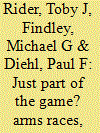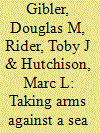|
|
|
Sort Order |
|
|
|
Items / Page
|
|
|
|
|
|
|
| Srl | Item |
| 1 |
ID:
158846


|
|
|
|
|
| Summary/Abstract |
Does trade reduce conflict even when states compete over high-salience issues (e.g., territory)? Despite recent challenges to liberal peace theory, few studies have examined whether the trade-reduces-conflict argument is robust to particularly conflict prone issues like territory. We evaluate whether trade reduces not only violent conflict over territory, but also the incentives to use specific power politics behaviors (e.g., arms races) associated both with territorial competition and a higher probability of war. As key causal mechanisms, we rely on opportunity costs and the ability to credibly signal information that increased trade generates, reducing states’ incentives to engage in violent conflict and arms races. Empirical analyses, using multiple sample populations and different measures of key indicators and outcomes, are consistent with our expectations. The results suggest that trade may reduce conflict both directly, by decreasing the likelihood of militarized disputes, and indirectly, by reducing the likelihood of power politics strategies like arms races, thought to increase the likelihood of war.
|
|
|
|
|
|
|
|
|
|
|
|
|
|
|
|
| 2 |
ID:
102511


|
|
|
|
|
| Publication |
2011.
|
| Summary/Abstract |
In this study, we look at the relationship of arms races to war, with appropriate consideration of rivalries. Are arms races more common in rivalries than in lesser competitions? Are they merely a consequence of rivalry competitions? How do the patterns of arms races map with those of war in rivalries? We explore these concerns with an empirical examination of rivalry and non-rivalry populations in the 1816-2000 period. In brief, we find that: arms races occur most frequently in the context of enduring rivalries; arms races are more likely in the middle and later stages of rivalry; the frequency of arms races is higher in rivalries with war than rivalries that do not experience war; and only when arms races occur in the later phases of rivalries is there an increased chance of war. Our study narrows the scope of the arms race-war relationship relative to past studies, demonstrating that the arms race-war relationship is conditional on rivalry processes.
|
|
|
|
|
|
|
|
|
|
|
|
|
|
|
|
| 3 |
ID:
060253


|
|
|
| 4 |
ID:
123627


|
|
|
|
|
| Publication |
2013.
|
| Summary/Abstract |
Arms races are costly and inefficient; therefore, standard causal explanations, based on threat perception, are inadequate, as states should prefer to resolve disagreements prior to the onset of these inefficient competitions. Building on recent research, arms races are alternatively conceptualized as a product of uncertainty, used to reveal information. Expectations are derived regarding when arms races should be most likely, allowing for one of the first systematic, quantitative tests of the causes of arms races. Empirical tests support theoretical expectations that arms races are most likely in contexts where there are salient competitive stakes and high levels of uncertainty, such as territorial rivalries or the early tenure of new leaders. The theoretical logic and empirical tests not only produce insights into why states participate in costly and inefficient arms races but also hint at a better understanding of the long puzzling relationship between arms races and war.
|
|
|
|
|
|
|
|
|
|
|
|
|
|
|
|
|
|
|
|
|